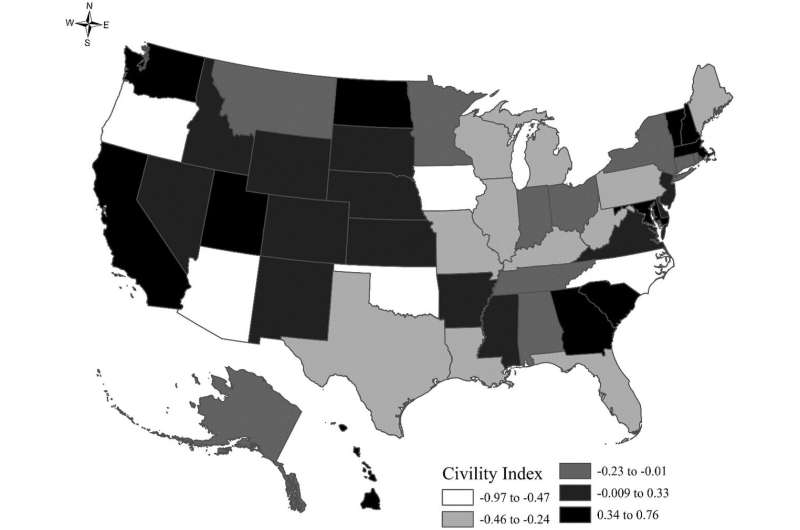This article has been reviewed according to Science X's editorial process and policies. Editors have highlighted the following attributes while ensuring the content's credibility:
fact-checked
trusted source
proofread
Study links political civility to the productivity of state legislatures

Bill Schreckhise and Eric Button, professors of political science at the University of Arkansas, recently published a study with three co-authors showing that the extent to which state legislators behave in a civil manner among themselves is related to how effective they are at passing legislation.
The article "Legislative Civility, Gridlock, Polarization, and Productivity" was published in the State Politics & Policy Quarterly journal, which is published by the Cambridge University Press on behalf of the American Political Science Association.
Schreckhise, Button and their colleagues surveyed more than 1,200 registered lobbyists in each of the country's 50 states, asking them questions related to how the legislators in their state generally behaved towards one another.
Aggregating the state lobbyists' impressions by state, the researchers then determined which states had legislators who were more civil to each other, and which states' legislatures were seen as being less civil among themselves. They then compared each legislatures' overall level of civility with how many bills were passed, how much significant legislation was enacted, and whether the state legislatures passed their important budget bills on time in recent years.
"Although I expected a relationship between legislative civility and legislative performance, we were all surprised by the strength of the relationship between civility and performance," said Schreckhise, who is also chair of the U of A's Department of Political Science in the Fulbright College of Arts and Sciences.
"Our findings indicate that the states where legislators were the most civil towards each other passed roughly twice the number of bills that the most uncivil legislatures passed," he continued. "This is the case even when considering a variety of things that can help or hinder a legislature's productivity, such as how much staff support the legislators receive and the length of their legislative sessions."
Nicholas Lovrich, one of the co-authors of the study, added, "At a time when the tenor of our political discourse is growing less civil, including that of our elected leaders, our findings show that political incivility is having a real effect on our nation's ability to govern—both in Congress and in our state capitols."
"Our study shows that such behavior has very real-world consequences for governance," said Lovrich, of Washington State University's School of Politics, Philosophy and Public Affairs.
More information: William D. Schreckhise et al, Legislative Civility, Gridlock, Polarization, and Productivity, State Politics & Policy Quarterly (2023). DOI: 10.1017/spq.2023.23
Provided by University of Arkansas



















